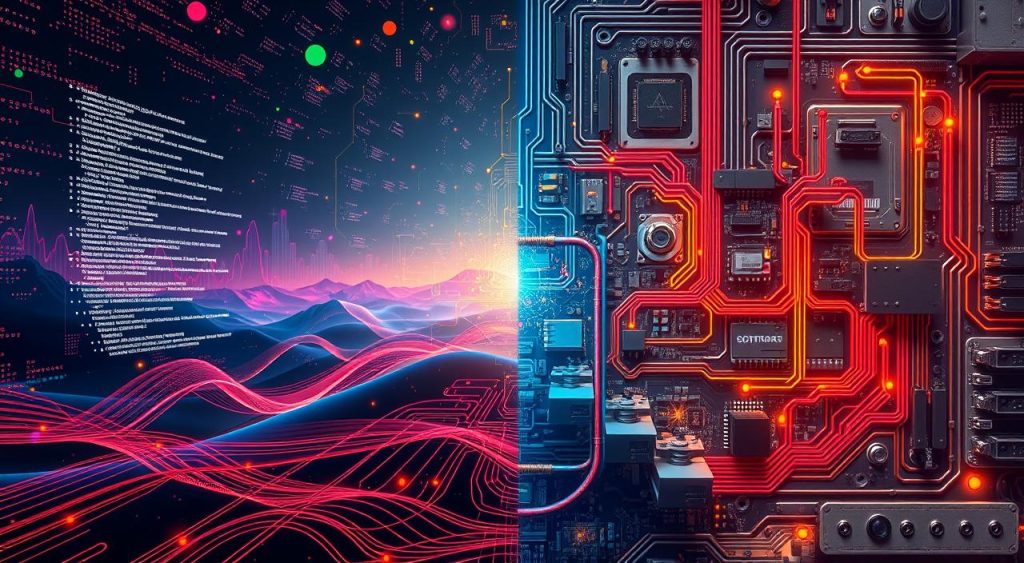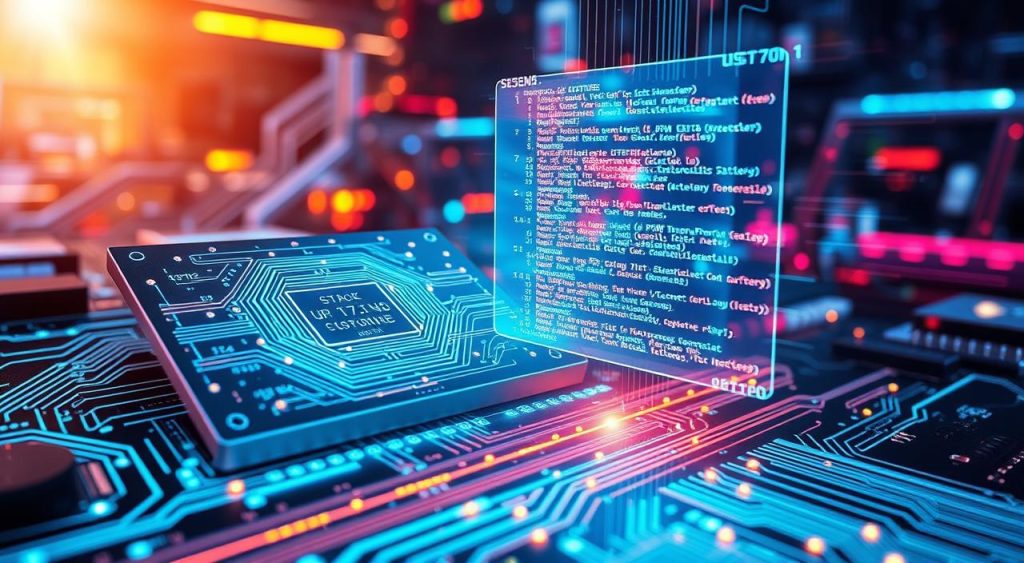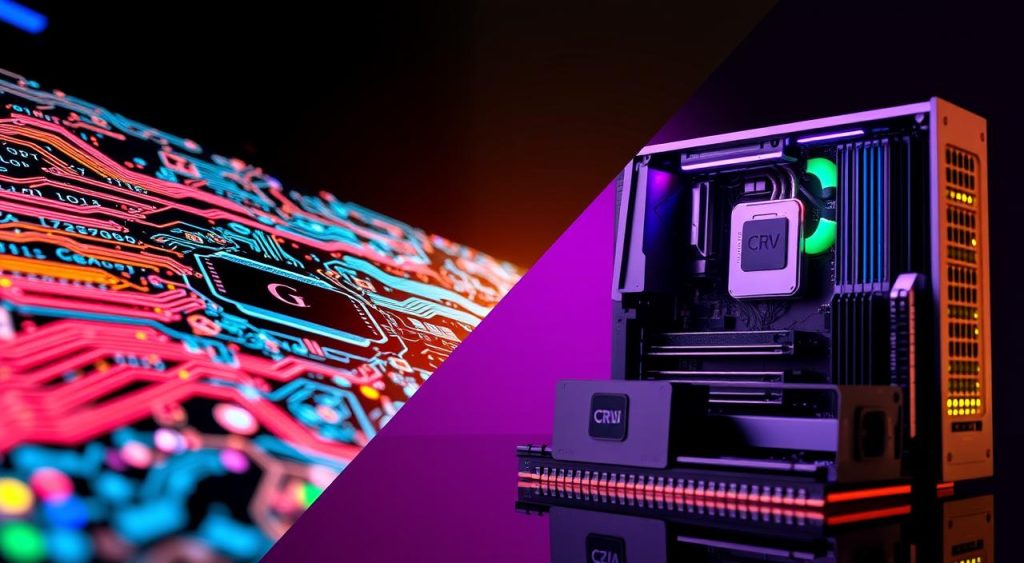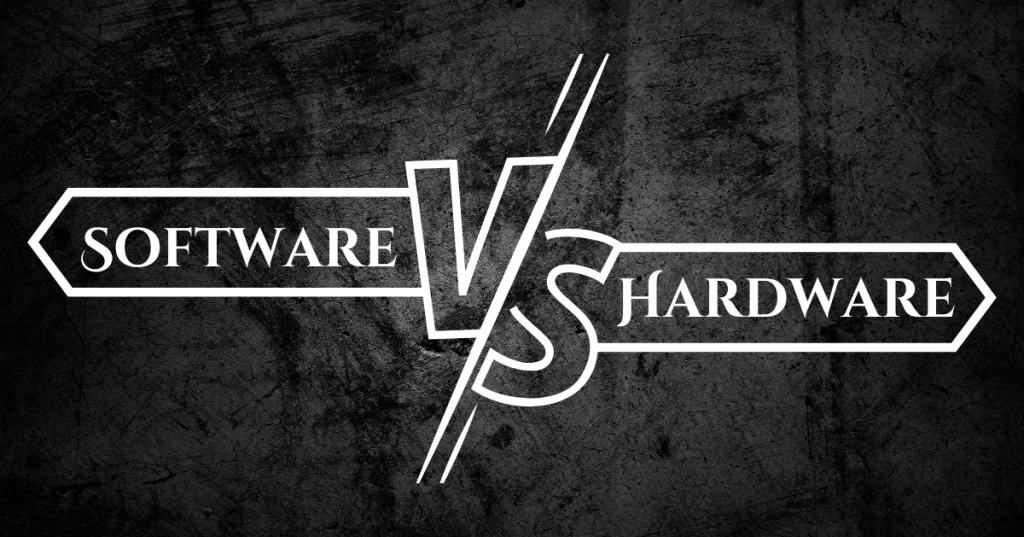Bill Gates once said, “The great thing about a computer is that it can do anything, but the bad thing is that it can do anything.” This shows how important it is to know the difference between software vs hardware. These two parts work together to make computers, smartphones, and other devices work.

It’s key to understand the difference between software and hardware. This knowledge helps when buying, upgrading, or fixing computer systems. Software are the programs and systems that run on hardware. Hardware are the physical parts of a computer.
The debate between software and hardware is ongoing. But, it’s clear that both are needed for a computer to work. They work together, making each unique and necessary.
Key Takeaways
- Software and hardware are two essential components of a computer system
- The difference between software and hardware is that software runs on hardware
- Understanding the comparison of software and hardware is vital for making informed decisions
- Software vs hardware is not a debate, but a way to understand how they work together
- The software and hardware differences are what make them unique and necessary for a functional computer system
- Knowing the difference between software and hardware can help with troubleshooting and upgrading computer systems
Read More: Comparing 4G vs 5G: What’s the Difference?
Understanding the Fundamentals of Software and Hardware
To understand software and hardware, we need to know what each is. Software gives instructions, and hardware does the work. They work together, showing how important they are to each other.
Hardware parts include the CPU, RAM, and storage devices. Input and output devices like keyboards and monitors are also part of it. Software, on the other hand, includes operating systems and apps. It’s all about what they do and why they exist.
Defining Hardware Components
Hardware parts are the physical parts of a computer. They carry out the tasks given by software. The CPU does math and runs instructions, while RAM holds data temporarily.
Software Categories and Types
Software is divided into types based on what it does. System software manages the computer’s parts. Application software does specific tasks, like writing or browsing the web.

Basic Interaction Between Software and Hardware
Software and hardware work together for a computer to function. Software tells hardware what to do. For example, when you write a document, software tells the computer to show it on the screen.
| Component | Function |
|---|---|
| Hardware | Executes instructions |
| Software | Provides instructions |
The Core Difference Between Software and Hardware
It’s key to know the difference between software and hardware in tech. Software is not physical and exists only as digital code. Hardware, on the other hand, is something you can touch and see.
Understanding software vs hardware helps us use tech better. Software can change easily without touching the computer. But, changing hardware means replacing parts, which is harder and more expensive. Knowing the difference helps us choose the right tech for our needs.

Software and hardware work together. Hardware gives software a place to run, and software makes hardware do things. Knowing this helps us use tech more effectively.
Learn More: HTTPS vs HTTP: What’s the Difference?
As tech keeps getting better, knowing software and hardware is more important. It lets us find new ways to use tech and push it forward.
Real-World Applications and Use Cases
Knowing the difference between software and hardware is key. It helps in making smart choices in many fields. For example, in business, software like Microsoft’s helps streamline tasks. On the other hand, companies like Dell and HP make the hardware needed to run these apps.
When deciding between software and hardware, think about what you need. In tech for people, it’s about what you like. Do you prefer a certain operating system or device? Software and hardware work together. For example, Adobe Photoshop needs a certain device to work well.
In places like factories, both hardware and software are vital. They help control and watch over complex systems. IoT devices are a good example. They use software to gather and analyze data and hardware to send and get signals. Knowing the difference helps us choose the right tech for better performance.
| Industry | Software Application | Hardware Requirement |
|---|---|---|
| Business | Microsoft Office | Dell Laptop |
| Consumer Technology | Adobe Photoshop | Apple MacBook |
| Industrial | IoT Device | Manufacturing Equipment |
Hardware and Software Dependencies
It’s important to know how hardware and software work together. They need each other to function well. Hardware needs software to tell it what to do. And software needs hardware to do its job.
When hardware and software work together, they do great things. But, if they don’t match, problems can happen. For example, new hardware without the right software can crash the system. Or, new software without the right hardware can cause issues.
So, it’s key to know how they depend on each other. This knowledge helps us make smart choices. Here’s a table that shows some important things to think about:
| Hardware Component | Software Requirement | Compatibility Considerations |
|---|---|---|
| Processor | Operating System | Ensure OS is compatible with processor architecture |
| Memory (RAM) | Applications | Ensure sufficient RAM for application requirements |
| Storage | File System | Ensure file system is compatible with storage device |
By thinking about these points, we can make better choices. This ensures our systems run smoothly and efficiently.
Impact on Modern Computing Systems
Knowing the difference between software and hardware is key for today’s computers. They work together to make systems run better. Software gives the instructions, and hardware carries them out.
Performance Considerations
How well a system performs depends on software and hardware. As tech gets better, we’ll see more of them working together. This will make systems more efficient and powerful.
Cost Analysis
Software and hardware cost different amounts to make and keep up. Software is usually cheaper than hardware. This affects how much a computer system costs.
Future Trends
Future tech will blend software and hardware more. Think of artificial intelligence, the Internet of Things, and cloud computing. Knowing the difference will help us understand and use these new techs.
Conclusion: Making Informed Technology Decisions
The difference between software and hardware is key for smart tech choices. It matters for both personal and work needs. Knowing how software and hardware work together helps improve tech setups. It also makes systems run better and saves money.
As technology keeps getting better, knowing the software and hardware difference is more important. This article has given a detailed look at the differences. It helps readers understand the tech world better and make choices that fit their needs.
Understanding software and hardware helps in making the most of tech investments. It boosts system performance and keeps you updated in the digital world.
FAQ
What is the difference between software and hardware?
Software and hardware are different in many ways. Hardware is something you can touch and see. Software, on the other hand, is just digital information.
Hardware includes things like the CPU, memory, and devices you use. Software is the programs and systems that run on this hardware.
How do software and hardware interact?
Software and hardware work together closely. Software tells hardware what to do. When you use a program, it sends commands to the hardware.
For example, when you type in a word processor, the software tells the hardware to show the text on the screen.
What are the different types of software and hardware?
There are many types of software and hardware. Software can be system software, like operating systems, or application software, like word processors.
Hardware includes the CPU, memory, and devices like keyboards and monitors.
How do the differences between software and hardware affect technology decisions?
Knowing the difference between software and hardware is key. In business, software helps with tasks and data management. Hardware supports these applications.
For people, choosing between software and hardware depends on what they need. Understanding these differences helps make better tech choices.
How do software and hardware dependencies affect computing systems?
Hardware and software need each other to work. Hardware executes software’s instructions. Software needs hardware to run.
Changes in either can affect the whole system. Knowing this helps ensure everything works well together.



